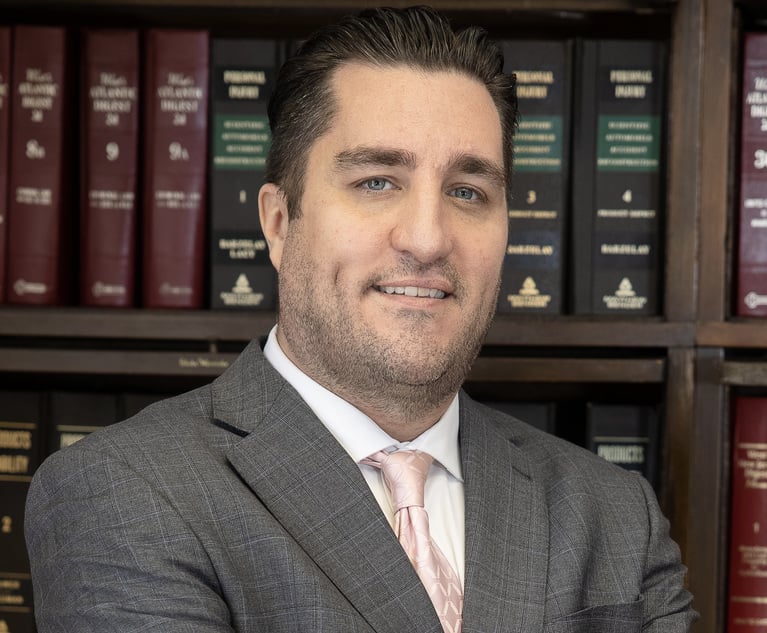Appeals Court Allows Civil Reservation in Child Endangerment Guilty Plea
The case stems from the December 2015 death of a 5-month-old boy at the defendant's home day care business.
May 18, 2018 at 04:23 PM
5 minute read

A New Jersey criminal defendant's desire to guard her finances from civil litigation is good cause to permit entry of a guilty plea with a civil reservation, the Appellate Division ruled Friday in a case of a woman charged with third-degree endangering the welfare of a child.
The appeals court reversed a Middlesex County judge's decision denying the civil reservation.
The case stems from the December 2015 death of a 5-month-old boy at the defendant's home day care business. Maryann McIntyre-Caulfield, who placed the child on his belly for a nap, was charged with endangering the welfare of a child, and was hit with a civil suit by the child's parents.
Since the 1990s, the American Academy of Pediatrics has recommended that infants sleep on their backs in order to reduce deaths from Sudden Infant Death Syndrome.
Prosecutors offered McIntyre-Caulfield admission to pretrial intervention, which would result in the charges being dropped if she completed the program, but required her to plead guilty. But before she entered a guilty plea, her homeowner's insurance carrier disclaimed coverage in the civil case, leaving her exposed to devastating financial consequences because the parents could use her plea as an admission of liability.
In requesting pretrial intervention, McIntyre-Caulfield maintained that the potential that she would face financial ruin met the standard for just cause under R. 3:9-2. But the trial judge rejected the PTI application in October 2017.
The prosecution consented to the civil reservation, but the parents of the deceased infant, who were not parties to the criminal case, entered objections.
On interlocutory appeal, Judges Clarkson Fisher Jr., Douglas Fasciale and Scott Moynihan said the judge below erred by denying the request for a civil reservation. Noting that case law has provided two examples for events warranting a civil reservation—when such an agreement is needed to remove an obstacle to a defendant'ts guilty plea to a criminal charge, and when the civil consequences of a plea may wreak devastating financial havoc on a defendant—the appeals court said both conditions have been met here.
The judge below cited the fact that no civil suit had been filed at the time of the defendant's plea. But “the plain text of the rule, and the case law interpreting it, does not make its applicability dependent on a filed lawsuit,” Fasciale wrote for the court. “The existence of a good faith fear—that a civil claimant will later use the guilty plea as an admission of liability in a civil case—triggers the rule. That fear is readily apparent here: on behalf of the parents and estate, two separate civil attorneys wrote defendant; one sent her a letter even before the State filed the second-degree charge,” Fasciale wrote.
The trial judge also cited the defendant's failure to provide evidence of her pre-existing financial condition, but the court rule and case law make no such requirement, the appeals court said.
And the trial judge also based his decision in part on the defendant's failure to challenge the insurance company's disclaimer in court, but “requiring defendant to adjudicate an insurance-coverage declaratory judgment lawsuit could take years to resolve,” Fasciale wrote.
The trial judge also suggested the civil reservation issue could be stayed pending McIntyre-Caulfield”s completion of the three-year PTI term. But the appeals court said that such an approach was fraught with problems—both the criminal and civil cases would have to be stayed, implicating the defendant's constitutional rights to a speedy trial in the criminal case, the appeals court said. In addition, witnesses' memories would fade over time, and the parties in the civil case would face a financial and emotional cost from having the stayed litigation unresolved, the court said.
McIntyre-Caulfield's lawyer, Darren Gelber of Wilentz, Goldman & Spitzer in Woodbridge, New Jersey, said civil reservations were frequently granted in municipal court in connection with traffic accidents, but were less commonly seen in criminal matters in Superior Court. Gelber said the ruling would make it easier for defendants in Superior Court to obtain a civil reservation.
Under the court rules, in municipal court, a civil reservation is typically granted as a matter of course, unless the prosecution shows good cause why it should not be, said Gelber. But in Superior Court, a defendant has the burden to show he is entitled to a civil reservation, Gelber said.
The difficulty in obtaining a civil reservation in Superior Court could be a matter of the small number of reported cases on that subject, and the latest decision should help that situation, said Gelber.
Michael Landis of Lowenthal & Abrams in Philadelphia, who represents the parents of the deceased infant, did not return a call about the ruling.
This content has been archived. It is available through our partners, LexisNexis® and Bloomberg Law.
To view this content, please continue to their sites.
Not a Lexis Subscriber?
Subscribe Now
Not a Bloomberg Law Subscriber?
Subscribe Now
NOT FOR REPRINT
© 2025 ALM Global, LLC, All Rights Reserved. Request academic re-use from www.copyright.com. All other uses, submit a request to [email protected]. For more information visit Asset & Logo Licensing.
You Might Like
View All
An Overview of Proposed Changes to the Federal Rules of Procedure Relating to the Expansion of Remote Trial Testimony
15 minute read
Appellate Division Rejects Third Circuit Interpretation of NJ Law, Says No Arbitration for Insurance Fraud
4 minute read

'Go 12 Rounds' or Settle: Rear-End Collision Leads to $2.25M Presuit Settlement
Trending Stories
- 1Silk Road Founder Ross Ulbricht Has New York Sentence Pardoned by Trump
- 2Settlement Allows Spouses of U.S. Citizens to Reopen Removal Proceedings
- 3CFPB Resolves Flurry of Enforcement Actions in Biden's Final Week
- 4Judge Orders SoCal Edison to Preserve Evidence Relating to Los Angeles Wildfires
- 5Legal Community Luminaries Honored at New York State Bar Association’s Annual Meeting
Who Got The Work
J. Brugh Lower of Gibbons has entered an appearance for industrial equipment supplier Devco Corporation in a pending trademark infringement lawsuit. The suit, accusing the defendant of selling knock-off Graco products, was filed Dec. 18 in New Jersey District Court by Rivkin Radler on behalf of Graco Inc. and Graco Minnesota. The case, assigned to U.S. District Judge Zahid N. Quraishi, is 3:24-cv-11294, Graco Inc. et al v. Devco Corporation.
Who Got The Work
Rebecca Maller-Stein and Kent A. Yalowitz of Arnold & Porter Kaye Scholer have entered their appearances for Hanaco Venture Capital and its executives, Lior Prosor and David Frankel, in a pending securities lawsuit. The action, filed on Dec. 24 in New York Southern District Court by Zell, Aron & Co. on behalf of Goldeneye Advisors, accuses the defendants of negligently and fraudulently managing the plaintiff's $1 million investment. The case, assigned to U.S. District Judge Vernon S. Broderick, is 1:24-cv-09918, Goldeneye Advisors, LLC v. Hanaco Venture Capital, Ltd. et al.
Who Got The Work
Attorneys from A&O Shearman has stepped in as defense counsel for Toronto-Dominion Bank and other defendants in a pending securities class action. The suit, filed Dec. 11 in New York Southern District Court by Bleichmar Fonti & Auld, accuses the defendants of concealing the bank's 'pervasive' deficiencies in regards to its compliance with the Bank Secrecy Act and the quality of its anti-money laundering controls. The case, assigned to U.S. District Judge Arun Subramanian, is 1:24-cv-09445, Gonzalez v. The Toronto-Dominion Bank et al.
Who Got The Work
Crown Castle International, a Pennsylvania company providing shared communications infrastructure, has turned to Luke D. Wolf of Gordon Rees Scully Mansukhani to fend off a pending breach-of-contract lawsuit. The court action, filed Nov. 25 in Michigan Eastern District Court by Hooper Hathaway PC on behalf of The Town Residences LLC, accuses Crown Castle of failing to transfer approximately $30,000 in utility payments from T-Mobile in breach of a roof-top lease and assignment agreement. The case, assigned to U.S. District Judge Susan K. Declercq, is 2:24-cv-13131, The Town Residences LLC v. T-Mobile US, Inc. et al.
Who Got The Work
Wilfred P. Coronato and Daniel M. Schwartz of McCarter & English have stepped in as defense counsel to Electrolux Home Products Inc. in a pending product liability lawsuit. The court action, filed Nov. 26 in New York Eastern District Court by Poulos Lopiccolo PC and Nagel Rice LLP on behalf of David Stern, alleges that the defendant's refrigerators’ drawers and shelving repeatedly break and fall apart within months after purchase. The case, assigned to U.S. District Judge Joan M. Azrack, is 2:24-cv-08204, Stern v. Electrolux Home Products, Inc.
Featured Firms
Law Offices of Gary Martin Hays & Associates, P.C.
(470) 294-1674
Law Offices of Mark E. Salomone
(857) 444-6468
Smith & Hassler
(713) 739-1250






